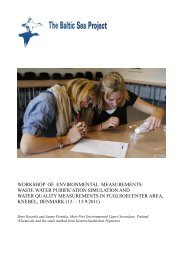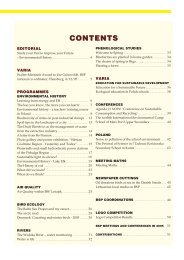newsletter_2008_1.pdf - 5.84 MB - The Baltic Sea Project
newsletter_2008_1.pdf - 5.84 MB - The Baltic Sea Project
newsletter_2008_1.pdf - 5.84 MB - The Baltic Sea Project
Create successful ePaper yourself
Turn your PDF publications into a flip-book with our unique Google optimized e-Paper software.
Lunch break with entertainment<br />
During the conference, the participants had the opportunity<br />
to visit fish landing sites, fishermen camps, an international<br />
fish market, wetlands, a dumping site, and a waste<br />
water treatment plant. In these areas, the participants<br />
gained a clear picture on the extent of pollution in Lake<br />
Victoria, the over fishing of the Nile perch, the problem of<br />
plastic bags, which are out of control in the dumping site,<br />
the re-use of fish waste in chicken feed, the overcrowding<br />
of people in fishermen camps, which has resulted in<br />
the spread of HIV/AIDS in the area. <strong>The</strong> situation that the<br />
participants faced in this study visit in Mwanza was said<br />
to be similar to Kenya and Uganda. Thus, the study visit<br />
challenged the participants to deal with the situation in a<br />
better way in the better future.<br />
<strong>The</strong> next conference, one year later in Entebbe, was<br />
opened by Mr. Patrick Ssembele from the Uganda Ministry<br />
of Education who stressed the importance of a new educational<br />
policy in the East African region, especially in<br />
the fields of environmental sciences, which should promote<br />
practical research and learning by doing. This vision<br />
became the guiding theme of the conference “Lake<br />
City parade in Entebbe.<br />
vARIA<br />
City parade in Entebbe<br />
Victoria - Our Concern” focusing on the development of<br />
a common program for investigations and activities in<br />
order to strengthen the common goals of the network and<br />
empowering its young members. This time, seminars and<br />
workshops were to a much greater extent prepared and<br />
led by students and young environmentalists.<br />
<strong>The</strong> students were trained in measuring chlorophyll in<br />
order to assess the grade of eutrophication, to take and<br />
handle tissue samples for analysis of heavy metals, and to<br />
watch and identify birds and use bird inventories for environmental<br />
mapping. <strong>The</strong> student delegates also spent their<br />
time producing their own handbook for young environmentalists<br />
and debating on how to correctly practice their<br />
democratic rights in order to protect the environment. For<br />
example, DDT against malaria will be allowed in Uganda,<br />
and students learnt to evaluate the risk of toxic biomagnifiaction<br />
and discussed optional antimalaria methods and<br />
ways to stop the use of DDT.<br />
<strong>The</strong> three scientific programs, chlorophyll measurements,<br />
heavy metal sampling, and bird inventory will be<br />
run parallel in all schools all around the lake and provide<br />
the students with a common foundation for data, discussions,<br />
and analysis. Newsletters, policy handbooks, learner<br />
guides, national gatherings, and regional conferences will<br />
be arenas for making joint conclusions and future plans.<br />
Rolf Erikson<br />
Teacher<br />
Nacka Gymnasium, Griffelvägen17, 131 40 Nacka, Sweden<br />
E-mail: rolf.c.eriksson@nacka.se<br />
29





